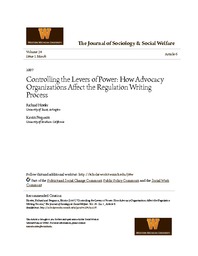
ATTENTION: The works hosted here are being migrated to a new repository that will consolidate resources, improve discoverability, and better show UTA's research impact on the global community. We will update authors as the migration progresses. Please see MavMatrix for more information.
Show simple item record
| dc.contributor.author | Hoefer, Richard | |
| dc.contributor.author | Ferguson, Kristin | |
| dc.date.accessioned | 2017-11-07T23:05:24Z | |
| dc.date.available | 2017-11-07T23:05:24Z | |
| dc.date.issued | 2007-03 | |
| dc.identifier.citation | Published in The Journal of Sociology & Social Welfare 34(1) Article 6: 83-108, 2012 | en_US |
| dc.identifier.uri | http://hdl.handle.net/10106/27060 | |
| dc.description.abstract | The Federal regulation-writing process is vital to understanding how laws are translated into policy. This paper re-examines data on human services interest groups active in lobbying the executive branch to determine what factors influence their effectiveness. Building on findings from Hoefer (2000), structural equation modeling is used to re-analyze the original regression model of interest group effectiveness (IGE) on a sample of 127 Washington D.C.-based interest groups. Results indicate that some of the previous findings are not supported and an alternative model is proposed. A group's position, context and access to information and policymakers emerge as significant determinants of IGE. Access also mediates the impact of a group's strategy and position on IGE. Implications for practice and future research are provided. | en_US |
| dc.language.iso | en_US | en_US |
| dc.publisher | Social Work at ScholarWorks at Western Michigan University | en_US |
| dc.subject | Regulation -- writing process -- Federal | en_US |
| dc.subject | Interest group effectiveness (IGE) | en_US |
| dc.subject | Structural equation modeling | en_US |
| dc.subject | Human services interest groups -- lobbying -- effectiveness | en_US |
| dc.title | Controlling the Levers of Power: How Advocacy Organizations Affect the Regulation Writing Process | en_US |
| dc.type | Article | en_US |
| dc.publisher.department | School of Social Work, The University of Texas at Arlington | en |
| dc.identifier.externalLink | http://scholarworks.wmich.edu/jssw/vol34/iss1/6 | |
| dc.identifier.externalLink | The original publication is available at the journal homepage | en_US |
Files in this item
- Name:
- Controlling the Levers of Power- ...
- Size:
- 1.238Mb
- Format:
- PDF
- Description:
- PDF
This item appears in the following Collection(s)
Show simple item record


